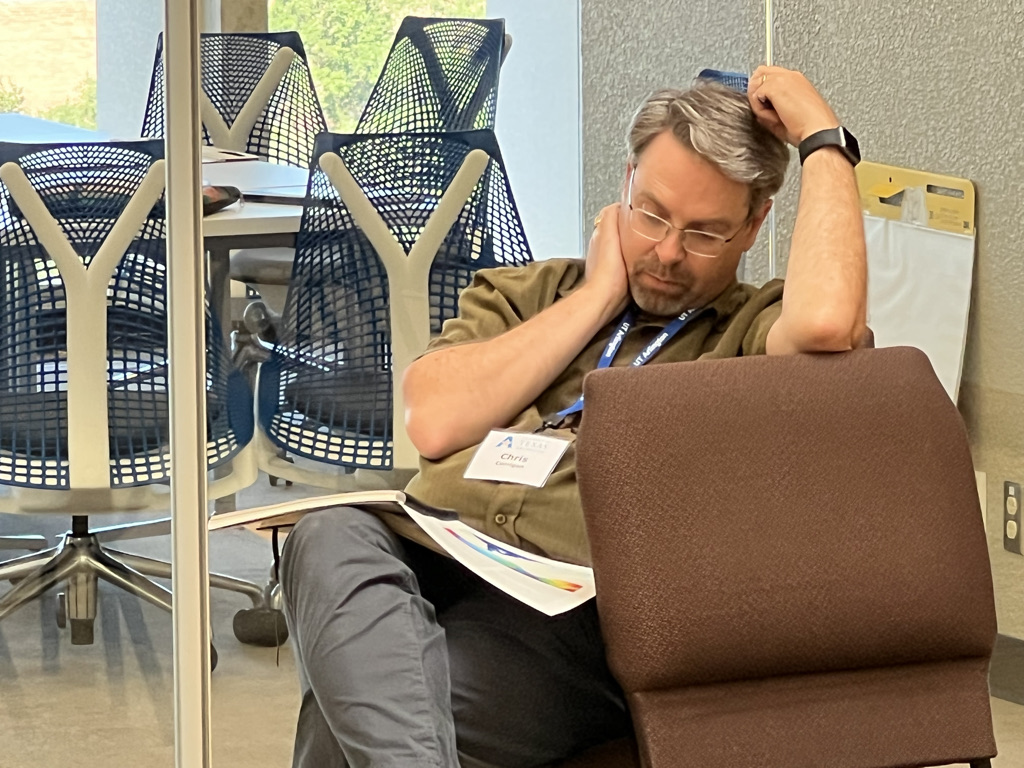Story work is hard

This is a picture of me, puzzling something out.
I’m about a third of the way through a 20-week Participatory Narrative Inquiry practicum with Cynthia Kurtz. We’ve been spending a lot of time talking about story, and story collection, because that is a really important aspect of generating the magic. As Cynthia said today “magic is amazing but all the folktales will tell you that it is always supposed to be hard.”
Today she shared an old blog post on the work being “too hard” and it’s worth quoting in depth:
Story work is hard. It is not clean or clear or simple. It is high input, high risk and high output. I find there is a tendency, probably common to all human beings, to jump past the first two parts of that sentence and pay attention only to the last part: high output. But all three parts are equally important. If input is not high enough — yours and every participant’s — or if things go wrong, the potentially high output of story work could be low or nonexistent, or even negative. Nobody should work with stories in organizations or communities without a full awareness of this fact. The reason story work digs deeper than other methods of inquiry is the same reason it is more likely to fail than other methods of inquiry. It is hard because it is good, and it is good because it is hard.
All of this makes working with stories hard to popularize. It’s not an approach that spreads like wildfire. I’d rather it be slow than wrong, and I’m not in any hurry to change the world, so I don’t mind if the majority of people stand off and view story listening from a distance…
…soak yourself in stories. Why? First, because before you have a good long soak in stories you can’t see the values they bring to inquiry, so you can’t sustain the high input required. Second, because until you understand the life of stories you won’t know where to place your high input, and you won’t know where the risks lie. Like a gardener who tries to grow food without learning to love the soil, you will bring failure upon your own efforts. Most of the people I’ve seen come to story work from other fields have not been willing to be with thousands of stories and learn how they live. They just want results, and that’s part of why they get frustrated. They aren’t in the world of stories to settle down, just to visit. But the world of stories doesn’t open itself to casual visitors. Only the locals know the soil, and only the locals grow the best tomatoes.
This has been my experience too. The amazing insights that come from working with stories together are like magic, but it is a lot of work to get it going and make it sing.


Great stuff! As always!
She’s pretty amazing.
Thx Chris.
I appreciate the required slowing and deepening that you bring.
Something like 10 years ago I started running workshops on story-telling for schools and school leadership. Stories shape school culture: they tell us who we are and who we want to be. But before you can tell a good story you first have to find it and then craft it. A great story-teller is first a great story-finder, I would say. But they found it hard, especially the finding and crafting part.
I would love to meet Kurtz one day. I think I would learn a lot.
P.S. I love that pic, Chris, and love that you take the time to puzzle things out…story-finding?
Good photo for your book of essays Chris.